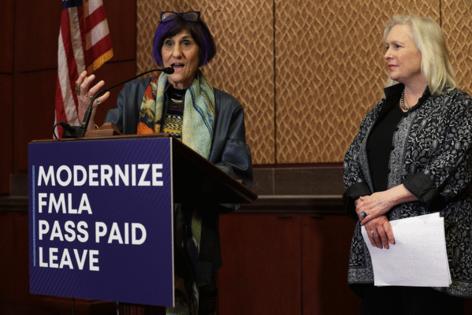Commentary: Paid family leave can be a lifeline
Published in Op Eds
A week before I gave birth last February, the research team I work with published a study in a prominent scientific journal on how paid family leave affects maternal and child health. The study found that having access to paid family leave led to a decrease in postpartum depression and an increase in the number of weeks babies are breastfed.
Yet the United States remains the only high-income country without a national paid family leave policy. Our sole federal policy, the Family and Medical Leave Act, only requires unpaid leave. Some states have enacted their own policies: California, where I live, mandates eight weeks of partially paid leave.
There has been a lot of movement in this area, both good and bad. Vermont recently announced a voluntary family leave plan. Pennsylvania lawmakers are considering whether to extend leave to more workers. In early October, Maryland lawmakers postponed implementation of their state’s program to 2027.
To get past these patchwork efforts, Sen. Kirsten Gillibrand, D-NY, and Rep. Rosa DeLauro, D-Conn., recently introduced the FAMILY Act, which would provide 12 weeks of partially paid leave for the arrival of a new child. The bipartisan House Paid Family Leave Working Group also recently introduced bills to increase access to state paid family leave.
Currently, 37 states lack mandatory paid family leave. Rates of maternal and infant mortality in the United States are the highest in the developed world. And, as our research shows, paid leave is an important way to improve the health of U.S. families.
I learned about the importance of paid leave firsthand when my son stopped gaining weight at a month old. My health care provider recommended I “triple feed” to increase my breastmilk. I breastfed, fed pumped milk, then pumped nearly continuously day and night for four weeks. Trying to do this while working would have been physically and emotionally impossible.
The American Academy of Pediatrics recommends exclusively breastfeeding for six months. Breast milk is great for babies’ immunity and development, but families should also have time to figure out what feeding method works best for them. Access to leave meant my baby got more breast milk, and it also protected my mental health.
As our research found, paid leave also reduces postpartum depression, which affects about one in eight women. That may be because it helps young mothers through the often difficult and stressful process of learning to care for their babies. When I was so sleep deprived I felt unsafe driving to the pediatrician, my leave, and my partner’s, gave me a lifeline to recover from birth and care for my often-hungry baby.
Our research also found that paid leave may increase attendance at postpartum check-ups, especially for low-income families who often have less job flexibility. Postpartum care is critical: More than half of pregnancy-related deaths occur after birth, and most are preventable.
But getting to appointments is hard enough with a newborn, let alone if you’re already back at work. My leave helped me get to my six-week postpartum check-up. If I’d skipped this appointment, I would have missed a referral to treat a health condition I developed after giving birth.
While some argue that paid leave is too expensive, the truth is that these policies pay for themselves. Paid leave helps mothers stay in the workforce, increasing their future earnings and tax contributions. It also reduces future health care costs by improving parent and infant health.
All parents throughout the United States should have access to paid family leave, regardless of what state they live in. To improve the health of the nation’s parents, Congress should make paid family leave available nationwide through a federal law that complements states’ efforts.
_____
Whitney Wells is a social epidemiologist and Ph.D. candidate at the University of California - San Francisco studying the health impacts of family support policies, and a new mom. This column was produced for Progressive Perspectives, a project of The Progressive magazine, and distributed by Tribune News Service.
_____
©2025 Tribune Content Agency, LLC.
























































Comments